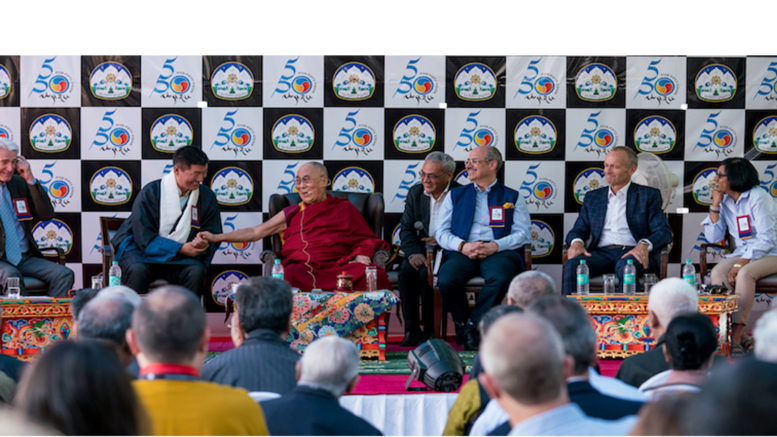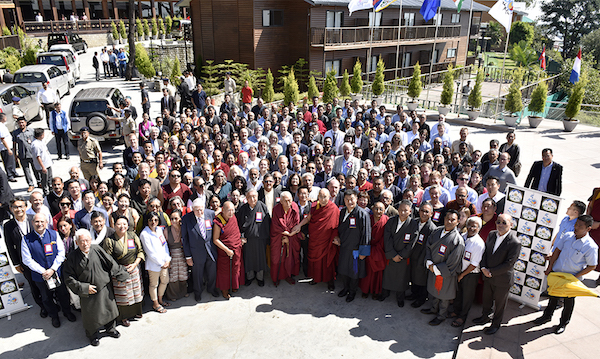DHARAMSHALA: His Holiness the Dalai Lama graced the second day of the Five-Fifty Forum organised by the Department of Information and International Relations (DIIR) of the Central Tibetan Administration (CTA) on 7 October at Hotel Pavilion in Dharamsala.
In his address, His Holiness the Dalai Lama shared his views on the degeneration of Tibet as a nation after the fall of the Tibetan empire, and the shortsighted leadership of the Tibetan administration in the late 19th and early 20th century.
“Historically, Tibet used to be a great nation comparable to the Chinese and Mongolian empires. However, after the disintegration of the Tibetan empire, the Tibetan nation gradually lost its sheen, compelling its spiritual leaders to focus only on religion,” His Holiness said.
“Even then, despite the political uncertainties, the three traditional provinces of Tibet were able to maintain a unified Tibetan identity due to the strength of the Tibetan language,” His Holiness explained.
“Tibetans are undergoing great turmoil and suffering imposed by China even now. However, we can take heart from the fact that we have a thousand millennium old cultural heritage. And despite China’s repression, Tibetans inside Tibet has shown great valour and courage in preserving the indomitable Tibetan spirit ” His Holiness said.
His Holiness also recalled China’s attempts to annihilate Tibetan religion and culture during the Cultural Revolution. “China tried to eliminate Tibet’s cultural identity through brainwashing, bribes and even force. But it failed. Chinese leaders never expected Tibet issue to remain alive even after 50 years. But it is alive and growing stronger,” he said.
His Holiness further urged Tibetans around the world to remember their roots and urged them to work for the Tibet cause in whatever capacity they can.
Addressing the participants of the forum, His Holiness told them that supporting Tibet is not just about being pro-Tibet but also about being pro-justice. “There are many communities fighting for freedom around the world. However, most of them employ violence to achieve their goals. Tibetans on the other hand have always been committed to the methods of peace and non-violence despite the hardships that we have faced,” His Holiness said.
His Holiness the Dalai Lama also spoke about his three main commitments in life i.e. promotion of human values, promotion of religious harmony and safeguarding Tibet’s environment, culture and language.
His Holiness the Dalai Lama also encouraged the inclusion of secular education in academic curriculum and said modern education is insufficient to create holistic happiness as it focuses more on material development.
“Despite the massive advances that modern education has made, it has remained vastly insufficient in the understanding of the human brain. To inculcate emotional hygiene along with physical hygiene in our brains, we need to start incorporating the knowledge of ancient India in the form of secular education in school syllabuses,” His Holiness said.
His Holiness also spoke about the futility of destructive emotions such as anger and jealousy.
Extolling the founding concept of the European Union, His Holiness said that nations should understand the concept of interdependence. “Nations should come together to tackle global issues such as climate change and environmental conservation. Issues such as global warming are not constrained by artificial national boundaries. It will affect all and therefore, we need a collective effort to resolve these issues,” His Holiness said.
His Holiness also lauded India for being a beacon of harmonious coexistence in the world. “If India, a country of such huge population with different religious backgrounds can maintain religious harmony, why not the rest of the world,” His Holiness asked, and said religion should be a source of joy and brotherhood.
Regarding the five-fifty forum, His Holiness said that this kind of intensive discussion on Tibet and its future would help energise a renewed international voice on Tibet that would be help the Tibet cause.
The session was moderated by Micheal Van Walt Van Praag, facilitated by President Dr Lobsang Sangay, with comments from Former Canadian minister Hon Stockwell Day and Shri Nalin Kohli.

His Holiness the Dalai Lama, CTA President Dr Lobsang Sangay and BJP National Spokesperson Nalin Kohli. Photo: Choejor/OHHDL



